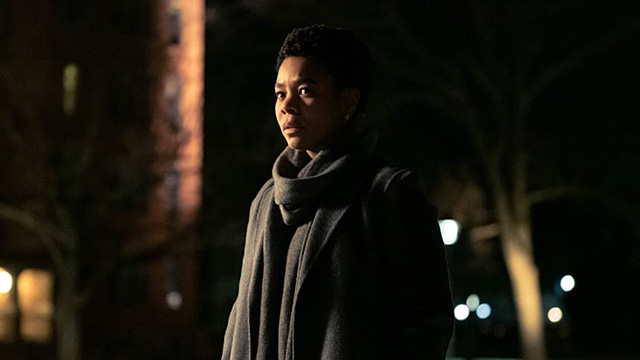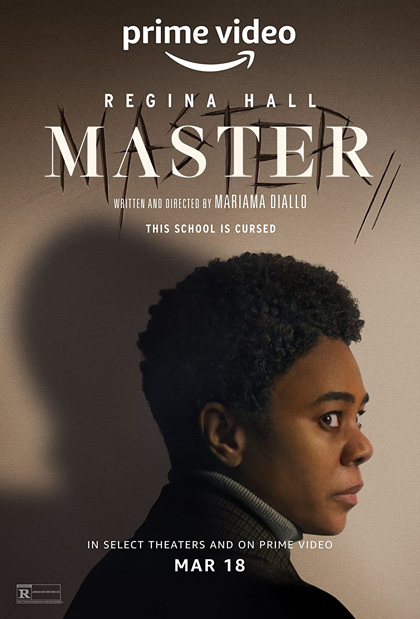

Tuesday March 22, 2022 | Slashley Reviews | Neal
Master...piece
Film Review by Ashley Turner
Watch "Master" now on Amazon Streaming!
Master is a film written and directed by Mariama Diallo; starring Regina Hall, Zoe Renee, Amber Gray, and Talia Ryder.
Synopsis: Two African American women begin to share disturbing experiences at a predominantly white college in New England.

Master opens with an introduction of two African American women beginning different phases of their lives at the fictitious Ancaster University. Gail Bishop (Regina Hall) and Jasmine (Zoe Renee) immediately experience slightly uncomfortable circumstances, establishing the thread weaving through this film.
Without knowing the synopsis, the beginning feels a bit disjointed in tone between the two characters. It almost felt like we were viewing two different time periods, and I thought I was viewing storylines running alongside one another on the same campus; one past and one present. It took me a quick moment to realize they were existing within the same timeline.
The scenes with Regina Hall felt more gritty and raw, with darker cool tones and stylized shots used at times that felt slightly Hitchcockian in nature. Inversely, Jasmine’s scenes carried a vibrance, saturated quality; along with the use of red tones and camera angle choices when experiencing her supernatural occurrences, felt much more in the present and contemporary. Both choices were great in supporting their horror style; but it did sometimes feel like I was watching two separate horror movies at the same time. Gale’s supernatural horror experiences felt more like tension-building to the point of impossible bending, until the psychological break; whereas Jasmine’s was more jump scares and monsters, leading to the same point. With that said, isn’t that how racism is? Each person experiences the ugly faces of that monster, leading to the same trauma and terror. The journeys of our lead characters display the varying individual effects of experiencing racism.
This movie has so many story elements, because the experience of racism in America is indeed so vast and horrific. Unfortunately, with so many powerful ideas being shown in one film, some of it doesn’t land in the way that it was likely intended. For those that have experienced racism: it is loud and clear. For the audience that is unaware, the message of some of these experiences may get lost in the mix.
We see our characters experiencing institutionalized racism through the house master and tenure selection process. Diallo also emphasizes the concept of “faux woke” rampaging across present-day America; manifesting in superficial selection under the guise of diversity. Pushing the token minority into the face of the public, all the while sweeping active racism under the rug. Both characters are constantly swallowing microagressions to just fit in. It’s that constant degradation that begs the question; how much can one take before they snap or die inside?
Diallo did not shy away from any uncomfortable topic when it came to race and I found that powerful. She highlighted the experience of how implicit bias is shaped among minorities and the inferiority complex that systemic racism creates within our own communities.
Diallo does an amazing job of capturing the tension and discomfort minorities face daily trying not to rock the boat. So many of us are taught to not stand out too much, not speak out too loudly, because it can all be taken away. Still today, standing out can come with a violent price. I find myself being just a little more careful with each word even as I write this. That social conditioning as a minority can be hard to shake. I’m hesitant to rock the boat on this subject or be “that person”…but screw it. Addressing race and the minority experience shouldn’t be taboo. It shouldn’t be the thing that alienates you. Just because one person doesn’t experience or perceive racism, does not negate its existence.
The Puritans stuck in the past did throw me for quite a loop, and I wasn’t quite sure how much they advanced the storyline. It was a straightforward metaphor for people absolutely resistant to change and racial integration, but it felt left-field and I found it distracting from the more powerful messages being relayed in the film. There were characters and ideas introduced and then dropped, which also muddled the storyline a bit.
Genre purists may roll their eyes and argue this is too political for horror (and believe me they have, I checked). I argue that horror is politics. The genre has been used as an avenue to teach morals (80s slasher flicks, anyone?), speak to governmental corruption and control on the masses (George Romero, the zombie genre, The Purge movies, etc), and so many other social commentary topics. Filmmaking is an art, and subjective to the artist. It is their expression. Artists have a message, a story to tell, and this is their story. We are not here to validate their experience. They don’t need the validation, just the avenue to express it. Bias, prejudice, and yes, god forbid someone use the racist word, run deep, as seen in this movie. Racism isn’t gone, it’s just tucked away, out of sight, hidden in cabinets, running deep through the walls of the house; always ringing like an annoying bell out of nowhere.
Master has so many ideas, that at times the tones feel as though they are combatting each other. The messages are important but do not always land in a cohesive way. The elements are important, but so many strong concepts are being introduced that it’s hard to truly develop each one in a lasting way. The entire cast delivers performances that push this storyline into a realm of dynamic storytelling and captivate the audience.
This movie uses the horror genre to place a microscope on institutionalized and accepted racism that actively haunts individuals in different ways. Although the use of many horror elements is perhaps an attempt to make this more relatable to a larger demographic, the fact is that the horror itself is the experiences these women face without the supernatural elements. The most powerful and poignant parts of this film are not the supernatural elements, but the obvious racism these women face. But that is horror isn’t it? Like Gail says, “It’s not ghosts, it’s not witches...it’s America.”
I would definitely recommend watching this film.
Without Your Head Horror Podcast's Nasty Neal interviews director Mariama Diallo & Zoe Renee of Master!